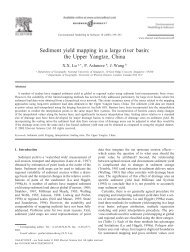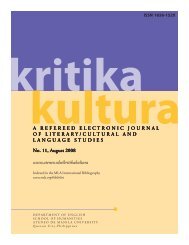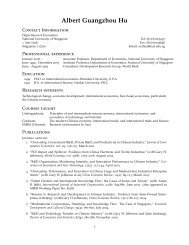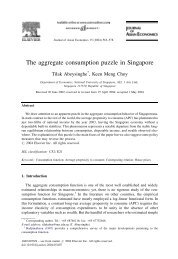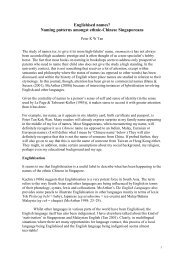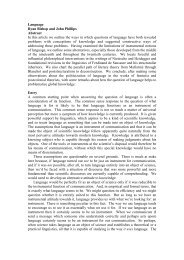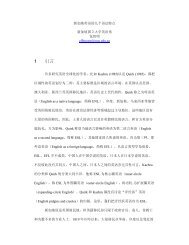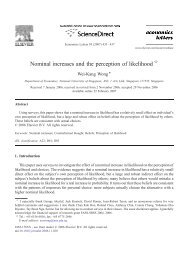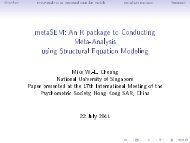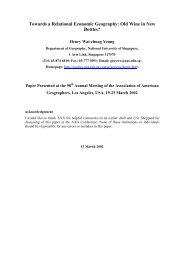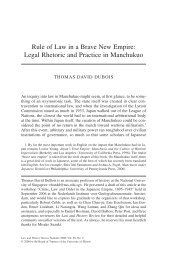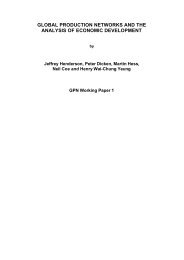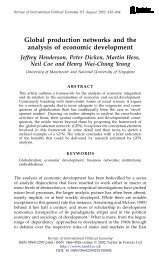Researching Hybridity in Social and Economic ... - NUS Home
Researching Hybridity in Social and Economic ... - NUS Home
Researching Hybridity in Social and Economic ... - NUS Home
You also want an ePaper? Increase the reach of your titles
YUMPU automatically turns print PDFs into web optimized ePapers that Google loves.
my th<strong>in</strong>k<strong>in</strong>g becom<strong>in</strong>g more reflexive <strong>and</strong> my reason<strong>in</strong>g about it becom<strong>in</strong>g less culturalist <strong>and</strong><br />
more transformative. While the change <strong>in</strong> my views on Ch<strong>in</strong>ese capitalism has a lot to do with<br />
my grow<strong>in</strong>g reflexivity <strong>in</strong> an <strong>in</strong>tellectual sense, it is also positively correlated with the<br />
dramatic pace at which globalization tendencies have transformed the world economy <strong>and</strong> the<br />
dynamic <strong>in</strong>tegration of Ch<strong>in</strong>ese capitalism <strong>in</strong>to these tendencies (as suppliers, strategic<br />
partners, <strong>and</strong> competitors). Just as reflexivity <strong>in</strong> my own positionality has changed my<br />
worldviews, there is a concomitant shift <strong>in</strong> the nature <strong>and</strong> economic organization of Ch<strong>in</strong>ese<br />
capitalism <strong>in</strong> association with the globalization of economic activities. 4 And it is this story of<br />
change <strong>and</strong> transformation <strong>in</strong> Ch<strong>in</strong>ese capitalism that underscores much of the concept<br />
hybridity. To me, Ch<strong>in</strong>ese capitalism does not exist as a “pure” form of capitalism because it<br />
evolves over time just like its Anglo-American, German <strong>and</strong> Japanese counterparts. Instead, it<br />
is a form of hybrid capitalism that is def<strong>in</strong>ed by its <strong>in</strong>complete, partial <strong>and</strong> cont<strong>in</strong>gent<br />
transformations towards an evolv<strong>in</strong>g set of capitalist norms, <strong>in</strong>stitutions <strong>and</strong> structures. We<br />
are <strong>in</strong>deed beg<strong>in</strong>n<strong>in</strong>g to witness the rise of a peculiar mode of hybrid capitalism characterized<br />
by the <strong>in</strong>fusion of a variety of disembedd<strong>in</strong>g economic logics <strong>and</strong> social organizations that<br />
defy easy identification <strong>and</strong> simple analysis. The very transformative nature of hybrid<br />
capitalism implies that there is no def<strong>in</strong>ite end-state <strong>and</strong> form because political <strong>and</strong> economic<br />
outcomes of transition depend very much on complex <strong>in</strong>teractions among social actors <strong>and</strong><br />
their embedded <strong>in</strong>stitutions. The territorial unboundedness of Ch<strong>in</strong>ese capitalism with<strong>in</strong><br />
dist<strong>in</strong>ctive national economies also contributes to its emergent hybridity because multiple<br />
forces <strong>and</strong> condition<strong>in</strong>g factors shap<strong>in</strong>g its structures <strong>and</strong> trajectories at the supra-national<br />
scale are at work. Put it rather crudely, much of Ch<strong>in</strong>ese capitalism today is like a banana –<br />
yellow outside <strong>and</strong> white <strong>in</strong>side. There is a curious mixture <strong>and</strong> juxtaposition of traditional<br />
Ch<strong>in</strong>ese practices <strong>and</strong> established norms <strong>and</strong> conventions <strong>in</strong> global capitalism (see more<br />
empirical analysis <strong>in</strong> Yeung, 2004a; see also Ong <strong>and</strong> Non<strong>in</strong>i, 1997; Gomez <strong>and</strong> Hsiao, 2004).<br />
9



